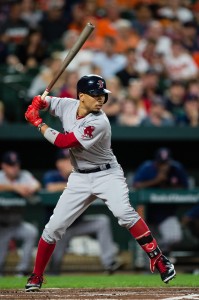Over the next few days, I will be discussing some of the higher profile upcoming arbitration cases. I rely partly on my arbitration model developed exclusively for MLB Trade Rumors, but will also break out some interesting comparables and determine where the model might be wrong. 2018 projections are available right here. We have already covered Manny Machado’s arbitration breakdown and Mookie Betts’s arbitration breakdown. Full 2018 projected arbitration salaries for every player are also available here at MLBTR.
Khris Davis is projected for a healthy raise of $6.1 million up to an $11.1 million salary due to his impressive 43 home runs this past year. With 110 RBI, but only a .247 average, the main case for Davis getting a big raise is definitely those home runs.
Home runs are notoriously important for arbitration, and are by far the main driver (along with playing time) of raises according to my model. However, this past season set a league record with 6,105 total home runs—this was 26 percent higher than the average from the last five years. So when I look at players with similar totals over the last five years, it is unclear whether an arbitration panel (or teams and agents that are negotiating in the shadow of what an arbitration panel would say) would treat home runs from Davis as similar to other players with the same number as home runs, or as someone with maybe 26 percent fewer home runs. My model does not adjust for league run environment in this way; in general the data has shown that run environment is not a big consideration in arbitration. Hitters in high scoring years benefit from being compared to hitters in lower scoring years, and pitchers in low scoring years benefit from being compared to pitchers in high scoring years.
Deflating Davis’ home run total by 26 percent would put him at 34 home runs, so it would still be a solid season. Chances are that a panel would view Davis as closer to a 40-homer guy (as would Davis’ reps and the A’s during negotiations in the shadow of how a panel would treat him), especially because the Oakland Coliseum deflates home runs, somewhat neutralizing the effect of the higher home run environment.
Only three guys entering their second years of arbitration have hit 40 home runs in the last five years: Two years ago, Josh Donaldson entered arbitration with a .297 average, along with 41 home runs and 123 RBI. His case seems superior to Davis’, mainly because of the fifty point batting average advantage. Thus, Donaldson’s $7.35 million raise seems like a likely ceiling for Khris Davis. Going back four years, we see homonym comparable Chris Davis getting a $7.05 million raise with 53 home runs and a .286 average, along with 138 RBIs; he seems like a ceiling as well. Nolan Arenado hit 41 home runs going into arbitration last year, but he also had a very high average (.294), so his $6.75 million raise seems like a ceiling too. So it is likely that the model is right to place Davis closer to $6 million than $7 million.
It is tough to find floors, but a couple potentials are Lucas Duda and Brandon Moss. Both hit in the .250s but with only 30 home runs, and got raises around $2.5 million. They are clearly well below where Davis should end up.
There is a large range of possibilities there. I think the model is probably as good a guess as any on this case, and I would look for Davis to land around $11 million. But I would probably think $10 million is more likely than $12 million based on the precedent from players like Arenado, Donaldson, and Chris Davis.

